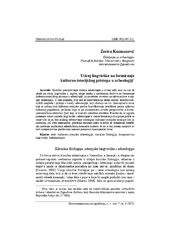Приказ основних података о документу
Uticaj lingvistike na formiranje kulturno-istorijskog pristupa u arheologiji
L'influence de la linguistique sur la formation de l'approche historico-culturelle en archéologie
| dc.creator | Kuzmanović, Zorica | |
| dc.date.accessioned | 2021-10-12T11:29:42Z | |
| dc.date.available | 2021-10-12T11:29:42Z | |
| dc.date.issued | 2012 | |
| dc.identifier.issn | 0353-1589 | |
| dc.identifier.uri | http://reff.f.bg.ac.rs/handle/123456789/1386 | |
| dc.description.abstract | Kritičko preispitivanje istorije arheologije u ovom radu ima za cilj da ukaže na uticaj lingvistike i, uopšte, uloge jezika u modernom društvu na formiranje kulturno-istorijskog pristupa u arheologiji, sa posebnim osvrtom na takve pojave u srpskoj arheologiji. U tom pogledu, ovaj rad se nadovezuje na seriju sličnih, kritičko-istorijskih pregleda i priloga o istoriji arheologije, koji ukazuju na tzv. konceptualni tovar koji sa sobom nosi kulturno-istorijska praksa klasifikovanja artefakata prema njihovoj kulturnoj pripadnosti, prilikom čega se po automatizmu izvode pretpostavke o kulturnom/etničkom identitetu ljudi koji su koristili određene artefakte. Potreba da se sagleda pomenuti odnos između lingvistike i arheologije u vreme formiranja discipline potiče sa stanovišta da je, bez nužnog odbacivanja celokupne kulturno-istorijske tradicije (što je, uostalom, još uvek nemoguće), potrebno razumeti kako je došlo do formiranja određenih značenja implicitnih arheološkom konceptu kulture, te da je tim putem moguće izbeći interpretativne greške koje nameće pomenuti konceptualni tovar. | sr |
| dc.description.abstract | Through the critical research into the history of archaeology, the paper aims to explore the influence of linguistics and, more generally, the role of language in modern societies, upon the formation of the culture-historical approach in the discipline, focusing upon the situation in the Serbian archaeology. In doing so, the author follows the series of the similar critical historical accounts of the history of archaeology, pointing to the conceptual burden carried along with the culture-historical practice of attributing artefacts according to their cultural affiliation, automatically making inferences about the cultural/ ethnic identity of the people who used them. The need to analyze the relationship between linguistics and archaeology at the time of formation of the discipline originates from the standpoint that, even if we do not advocate the complete rejection of the culture-historical tradition (still impossible, however), it is nevertheless necessary to understand the ways in which certain meanings were formed, implicit to the archaeological concept of culture. In this way, it becomes possible to avoid the interpretive mistakes inherent to the conceptual burden of the discipline. . | en |
| dc.publisher | Univerzitet u Beogradu - Filozofski fakultet - Odeljenje za etnologiju i antropologiju, Beograd | |
| dc.relation | info:eu-repo/grantAgreement/MESTD/Basic Research (BR or ON)/177008/RS// | |
| dc.rights | openAccess | |
| dc.rights.uri | https://creativecommons.org/licenses/by/4.0/ | |
| dc.source | Etnoantropološki problemi | |
| dc.subject | kulturno-istorijska arheologija | sr |
| dc.subject | komparativna lingvistika | sr |
| dc.subject | klasična filologija | sr |
| dc.subject | balkanologija | sr |
| dc.subject | culture-historical archaeology | en |
| dc.subject | comparative linguistics | en |
| dc.subject | classical philology | en |
| dc.subject | Balkan studies | en |
| dc.title | Uticaj lingvistike na formiranje kulturno-istorijskog pristupa u arheologiji | sr |
| dc.title | L'influence de la linguistique sur la formation de l'approche historico-culturelle en archéologie | fr |
| dc.title | The influence of linguistics upon the formation of the culture-historical approach in archaeology | en |
| dc.type | article | |
| dc.rights.license | BY | |
| dc.citation.epage | 628 | |
| dc.citation.issue | 3 | |
| dc.citation.other | 7(3): 615-628 | |
| dc.citation.rank | M24 | |
| dc.citation.spage | 615 | |
| dc.citation.volume | 7 | |
| dc.identifier.doi | 10.21301/eap.v7.i3.1 | |
| dc.identifier.fulltext | http://reff.f.bg.ac.rs/bitstream/id/340/1383.pdf | |
| dc.type.version | publishedVersion |

